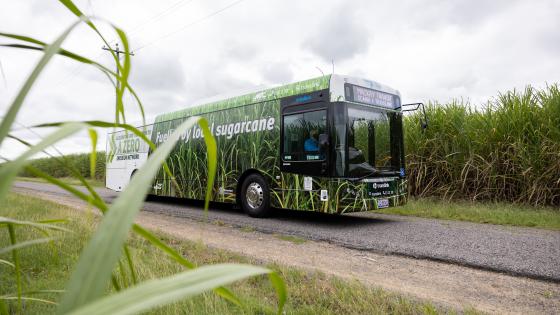Two state-of-the-art bioethanol-fuelled buses have arrived in Mackay for a Queensland-first 12-month trial on the city’s public transport network.
Running on bioethanol fuel produced from locally-grown sugarcane in Mackay, the Scania-owned buses will be the first of their kind used on Queensland public transport.
Translink delivery partner Mackay Transit Coaches will begin testing, with services scheduled to start later this month once all checks are complete.
Head of Translink Sally Stannard said the buses were another demonstration of Translink’s commitment to a cleaner, greener and more sustainable transport future.
“Compared to the traditional fuel that is used for many current buses, bioethanol is more environmentally-friendly,” Ms Stannard said.
"These buses represent a major step forward in delivering on the ‘environmentally sustainable’ priority, which is one of five key priorities in our Creating Better Connections for Queenslanders plan and outlines how new, lower emission vehicle technologies could make passenger transport even more of a cleaner and greener choice.
“That plan informs the next 10 years on passenger transport in our quest to operate a single, integrated, network that is accessible to all right across the state.
This trial has the potential to influence state-wide demand for biofuels as a renewable fuel source for transport.
“Scania’s research indicates that these bioethanol buses could reduce carbon by up to 90 per cent compared to traditional fuel, we’re excited to watch the trial as it unfolds over the next 12 months.”
Ms Stannard thanked Scania, Wilmar, the Department of State Development and BusTech, which built the buses at its Gold Coast facility, for their important roles in the $1.1m project.
The project will build on the Queensland Government’s commitment that every new bus in South East Queensland will be zero emissions from 2025, with regional implementation to begin between 2025 and 2030.
Mackay Transit Coaches CEO Reagon Forsyth said he couldn’t wait to start using the new buses on the network.
“We’re proud to be part of this project and eager to start giving customers a new experience on the buses,” Mr Forsyth said.
“Together with the Queensland Government, we’re working towards greener public transport in Mackay and this is another step towards that objective.
“We’re thankful for the opportunity to play our part in the trial and can’t wait to see how it progresses.”
Queensland Manager for Scania Bus Brian Thompson said Scania had committed around $1 million to the trial.
“This covers the provision of two rolling chassis and powertrains suited to ethanol fuel, as well as investing in the Australian-built bus bodies and the cost of installing a fuel depot at the bus company where the bulk and locally produced fuel will be stored,” he said.
“This is a significant investment for Scania, aimed at underlining our leadership of the shift towards a sustainable transport system.”
Operations Manager for Wilmar BioEthanol Pieter Van Vuren said Wilmar had a long association with Scania in promoting biofuels for passenger vehicles in Australia
"We’ve been making ethanol from molasses at our distillery for almost a century, so it’s fitting that we provide the fuel for the first formal trial of biofuel buses in this region," Mr Van Vuren said.
“We’re very proud to be part of a trial where bioethanol manufactured at Sarina is used to power buses in our own backyard.”
The trial is being funded by Scania and the Queensland Government.
The Queensland Government’s Biofutures 10-Year Roadmap and Action Plan outlines a vision for a $1 billion sustainable industrial biotechnology and bioproducts sector in Queensland and this project strongly aligns with realising this goal.
